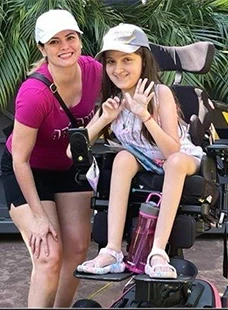
Along with our partners at the National Health Law Program, FHJP filed suit in federal court to challenge inadequate Medicaid notices that violate recipients due process right. At issue in the suit are the notices these agencies are using to alert people that their Medicaid coverage is ending. In just three months, more than 182,000 Floridians have been issued notices saying they are no longer eligible for coverage, and hundreds of thousands more will have their coverage reviewed in the coming year. As alleged in the Complaint, low-income individuals who are losing Medicaid coverage have no idea whether the State is making the right decision and whether (or how) to challenge their loss of coverage.
This class action successfully challenged Florida’s system-wide failure to protect the due process rights of extremely vulnerable beneficiaries, including children with disabilities aging out of the state’s adoption assistance program. The case resulted in significant corrective actions, including restoration of Medicaid for over 32,000.
Although numerous Florida courts of appeal have found that Florida’s standard to determine coverage of children’s Medicaid services is more restrictive than that set forth in the federal Medicaid Act, the state Medicaid agency refuses to correct it. This federal class action lawsuit seeks to stop Florida from denying care to children based on its overly restrictive standard.
In response to a state rule denying Medicaid coverage of all medically necessary gender-affirming care for transgender Florida residents, FHJP, along with Lambda Legal, Southern Legal Counsel, the National Health Law Program, and Pillsbury Winthrop Shaw Pittman LLP, filed a federal lawsuit. The rule left thousands of transgender people in Florida without access to critical medical care for the treatment of gender dysphoria. The Florida Medicaid Agency finalized the rule after ignoring expert testimony and thousands of public comments during the rule-making process. In May 2022, FHJP and co-counsel participated in a three week trial in the Northern District of Florida. Shortly before the close of trial, the Governor signed Fla. Stat. 286.31 into law which, among other things, prohibited the use of Medicaid funding to pay for gender affirming medical care. Counsel amended their Complaint to challenge this newly enacted ban along with AHCA’s rule. On June 21, 2023, the Honorable Judge Robert L. Hinkle entered a 54 page long Order declaring that both the rule and the statute violate the Equal Protection Clause of the U.S. Constitution, the Affordable Care Act, and the federal Medicaid Act and, as such, could not be enforced against Florida Medicaid beneficiaries.
Although the Florida Medicaid program covers the cost of incontinence supplies for medically incontinent children, the state stops paying for this essential medical service when the child turns 21. Along with co-counsel Disability Rights Florida (serving as both co-counsel and an organizational plaintiff) and Lewis Golinker, FHJP filed a class action complaint asking that the federal court order the state to provide much needed medical supplies for plaintiffs like Blanca M., a 22 year old Floridian who suffers from multiple disabilities, including spastic quadriplegic cerebral palsy, and who relies on a gastronomy tube for nutrition.
The Eleventh Circuit Court of Appeals ruled that Medicare must provide coverage for a beneficiary’s off-label use of a critically needed medication.
The Florida Medicaid Agency was refusing priority enrollment into the Long Term Care (LTC) waiver for 18-20 year old medically fragile youth who need 24-hour health care, an essential protection designed to ensure that critical health services are not reduced when the child turns 21. Shortly after FHJP and Disability Rights Florida filed an administrative petition challenging the agency’s erroneous interpretation of state law, the agency undertook extensive and robust corrective actions.
Medicaid managed care organizations’ (MCO) major third-party administrator, ATA (now HN1), places financial limits on access to pediatric therapies, including speech, occupational, and physical therapy for enrollees aged 3-20 in violation of EPSDT. HN1’s policies and procedures with regard to provider authorizations and notices also violate due process rights guaranteed under federal law. These EPSDT and due process violations have driven many pediatric therapists out of MCO networks, resulting in lack of network adequacy in several Florida regions. In partnership with the National Health Law Program, FHJP filed a complaint of behalf of two children in need of significant speech therapy being denied that critical therapy because of the HN1 Model. More information about the case can be found here: Voiceless: Medicaid Scheme Harms Children And Therapists (levernews.com).
Although the Affordable Care Act (ACA) required coverage for youth aging out of foster care until age 26 (“Former Foster Care” Medicaid), Florida’s application process resulted in former foster care children losing their Medicaid, and as of July 2020, only 67 children were in the program. In response to the detailed legal demand letter sent by FHJP and our partners, the state implemented corrective actions.
Visit the “Medicaid | The Lived Experience: Former Foster Care Children” page.
Home health care benefits are critical for low-income Floridians who are so frail and disabled that they require home and community based services (HCBS) as an alternative to institutionalization. FHJP successfully combines storytelling with litigation, a strategy which both helps individual storytellers/plaintiffs secure their health care rights and helps educate the public and decision makers about the importance of HCBS.

Florida Health Justice Project engages in comprehensive advocacy to expand health care access and promote health equity for vulnerable Floridians.
A copy of the official registration and financial information may be obtained from the division of consumer services by calling 1-800-HELP-FLA (435-7352) toll-free within the state. Registration does not imply endorsement, approval, or recommendation by the state.